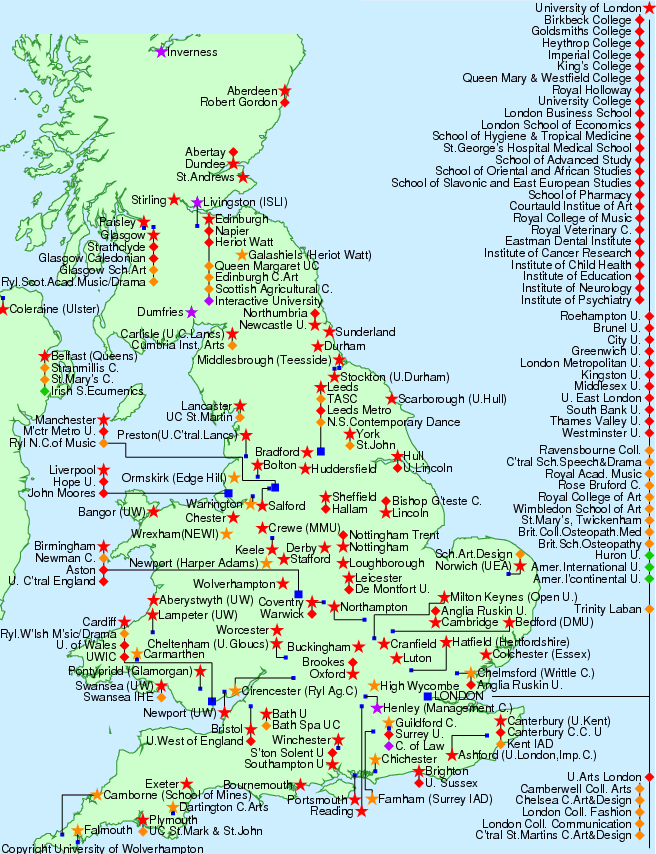The United Kingdom is divided into different regions, and each region has its own universities and colleges. Here is a list of UK universities by region:
London:
- University of Oxford
- University of Cambridge
- Imperial College London
- London School of Economics and Political Science (LSE)
- University College London (UCL)
- King’s College London
- School of Oriental and African Studies (SOAS)
- Institute of Education (University College London)
- Courtauld Institute of Art
- Royal Veterinary College
- Royal College of Art
- Royal College of Music
- Royal Academy of Music
- Trinity Laban Conservatoire of Music and Dance
- London Business School
- London School of Hygiene & Tropical Medicine
South East England:
17. University of Southampton
- University of Sussex
- University of Reading
- University of Surrey
- University of Kent
- University of Oxford (including colleges in Oxford)
- University of Buckingham
South West England:
24. University of Bristol
- University of Exeter
- University of Bath
- University of Plymouth
West Midlands:
28. University of Birmingham
- University of Warwick
- Coventry University
- University of Wolverhampton
East of England:
32. University of East Anglia (UEA)
- University of Hertfordshire
- University of Essex
- Anglia Ruskin University
North West England:
36. University of Manchester
- University of Liverpool
- Lancaster University
- University of Salford
- Manchester Metropolitan University
North East England:
41. Durham University
- Newcastle University
- Northumbria University
- Teesside University
Yorkshire and the Humber:
45. University of Leeds
- University of Sheffield
- University of York
- University of Hull
East Midlands:
49. University of Nottingham
- University of Leicester
- Loughborough University
Scotland:
52. University of Edinburgh
- University of Glasgow
- University of Aberdeen
- University of St Andrews
- University of Dundee
- University of Strathclyde
- Heriot-Watt University
- University of Stirling
- University of the West of Scotland
- Abertay University

Wales:
62. Cardiff University
- Swansea University
- Aberystwyth University
- Bangor University
Northern Ireland:
66. Queen’s University Belfast
- Ulster University
Please note that this list includes universities in their respective regions. There are many other universities and higher education institutions across the UK, each offering a wide range of programs and opportunities for international and domestic students. Be sure to research specific universities and their programs to find the best fit for your academic and career goals.

International students may consider choosing regional universities in the UK for several reasons:
- Lower Cost of Living: Regional universities are often located in smaller towns and cities where the cost of living is generally lower than in major urban centers like London. This can make it more affordable for international students to cover their living expenses, including accommodation, food, and transportation.
- Tuition Fees: Many regional universities offer competitive tuition fees compared to their counterparts in larger cities. This can be especially attractive to international students who are looking to receive a quality education without breaking the bank.
- Quality of Education: Regional universities in the UK still maintain high standards of education and research. They offer a wide range of academic programs and have dedicated faculty members who are experts in their fields. Students can expect a rigorous academic experience.
- Smaller Class Sizes: Smaller class sizes in regional universities can lead to more personalized attention from professors. This allows for greater interaction with instructors and fosters a supportive learning environment.
- Strong Community Atmosphere: Smaller towns and cities often have a close-knit and welcoming community. International students can feel more integrated and comfortable in such environments, which can ease the transition to a new country and culture.
- Diverse Student Body: Regional universities also attract a diverse student body, including international students from various backgrounds. This diversity can enrich the overall college experience and create a global perspective.
- Quality of Life: Smaller cities often provide a higher quality of life in terms of safety, access to nature, and a relaxed pace of life. International students can enjoy a well-rounded experience both inside and outside the classroom.
- Work Opportunities: Some regional areas in the UK offer specific work opportunities in industries that are relevant to certain academic programs. For example, certain regions may have a strong focus on agriculture, tourism, or specific types of manufacturing, providing students with practical experience.
- Scholarships and Financial Aid: Regional universities may have scholarships and financial aid opportunities for international students, making education more affordable.
- Reduced Competition: Smaller universities may have less intense competition for admission, making it easier for international students to secure a spot in their chosen program.
In conclusion, regional universities in the UK offer a cost-effective and high-quality education, a supportive environment, and a diverse community that can make the international student experience rewarding. It’s essential for international students to carefully research and consider their options when choosing a university, taking into account their academic and personal preferences, financial situation, and career goals.




